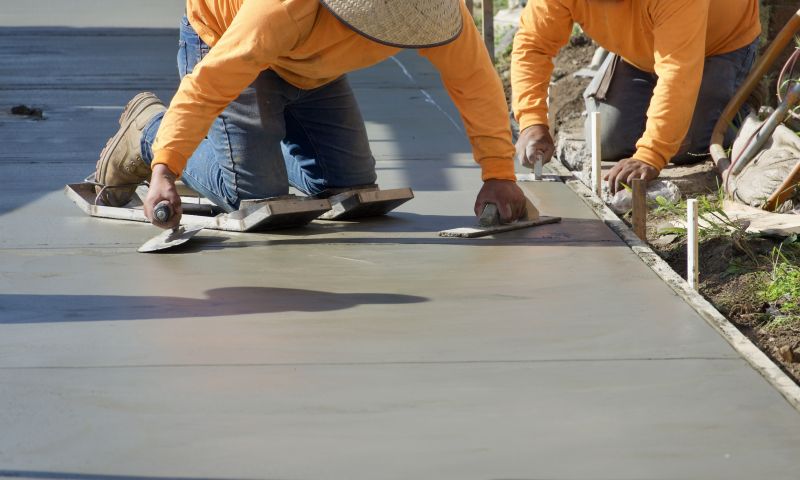Top-Rated Products For Efficient Concrete Installation Projects
Choose from high-performance tools and materials that boost productivity and ensure quality results in concrete work.
 Concrete installations are a fundamental aspect of construction projects, landscaping, and home improvement endeavors in Suwanee, GA. Selecting the right products ensures durability, safety, and aesthetic appeal for various applications such as driveways, sidewalks, patios, and foundations. The process of concrete installation involves multiple stages, including preparation, pouring, curing, and finishing, each requiring specialized tools and materials. Properly chosen products can facilitate smoother workflows and more consistent results, whether working on small DIY projects or large-scale commercial endeavors.
Concrete installations are a fundamental aspect of construction projects, landscaping, and home improvement endeavors in Suwanee, GA. Selecting the right products ensures durability, safety, and aesthetic appeal for various applications such as driveways, sidewalks, patios, and foundations. The process of concrete installation involves multiple stages, including preparation, pouring, curing, and finishing, each requiring specialized tools and materials. Properly chosen products can facilitate smoother workflows and more consistent results, whether working on small DIY projects or large-scale commercial endeavors.
Top Overall Option
Concrete Reinforcement Mesh
Concrete reinforcement mesh, often made of steel or fiberglass, provides structural support and helps prevent cracking in poured concrete slabs. It is versatile and suitable for a wide range of applications including driveways, patios, and foundation slabs. Proper installation of reinforcement mesh can enhance the durability and lifespan of concrete surfaces, making it a valuable component in many projects. When selecting reinforcement mesh, consider mesh size, material, and compatibility with your specific concrete mix to ensure optimal performance.
Types of Products For Concrete Installations
Concrete Mixes
Various concrete mixes are available tailored to different project needs, including standard, rapid-setting, and high-strength formulations.
Form Liners
Form liners create decorative patterns and textures on concrete surfaces, enhancing aesthetic appeal.
Reinforcement Materials
Includes steel rebar, mesh, and fiber reinforcements that add strength and crack resistance to concrete slabs.
Concrete Sealers
Sealants protect concrete surfaces from moisture, stains, and wear, extending their lifespan.
Curing Compounds
Applied to retain moisture during curing, ensuring proper setting and strength development.
Finishing Tools
Tools such as trowels, floats, and edgers help achieve smooth and professional-looking surfaces.
Concrete Vibrators
Vibrators eliminate air pockets and ensure proper compaction of poured concrete.
Expansion Joints
Allow for movement within concrete slabs, reducing the risk of cracking.
Form Release Agents
Facilitate the removal of forms after concrete curing without damaging the surface.
Concrete Edgers
Create clean, rounded edges for finished concrete surfaces.
Concrete Cutters and Saws
Used to make precise cuts in hardened concrete for expansion joints or modifications.
Anchors and Fasteners
Secure fixtures or structural elements to concrete surfaces.
Surface Texturing Tools
Add patterns or textures to concrete surfaces for slip resistance or decorative effects.
Waterproofing Membranes
Protect concrete structures from water infiltration and damage.
Concrete Pumping Equipment
Facilitates the efficient placement of concrete in hard-to-reach areas.
Popular Choices
Pre-mixed concrete bags are convenient for small to medium DIY projects.
Reinforcing steel bars are commonly used to strengthen concrete slabs and foundations.
Popular for protecting outdoor concrete surfaces from stains and weathering.
Help achieve a smooth finish on freshly poured concrete.
Frequently used to prevent cracking in large slabs and pavements.
Widely used to ensure proper compaction and eliminate air pockets.
Commonly applied to ease form removal and prevent surface imperfections.
Popular for creating clean edges on sidewalks and patios.
Help retain moisture during curing, especially in hot or dry conditions.
Applied to basement walls and other structures for added protection.
Essential for cutting hardened concrete for expansion joints or modifications.
Used to secure structural elements to concrete foundations.
Popular for creating slip-resistant or decorative finishes.
Commonly used in foundation and basement applications.
Facilitate the efficient placement of large volumes of concrete.
Increasingly used as an alternative to traditional steel reinforcement.
From reinforcing materials to finishing tools, there is a broad spectrum of products designed to optimize concrete work. For example, concrete mixes vary based on the desired strength and setting time, while accessories like sealants and curing compounds help preserve the integrity of the finished surface. Safety equipment such as gloves and eye protection is also critical during handling and application. Understanding the specific requirements of each project can aid in selecting the most suitable products, ensuring that the installation process is efficient and that the final outcome meets expectations.
In Suwanee, GA, local suppliers and hardware stores offer a wide array of these products, tailored to meet regional construction standards and climate considerations. Whether you are a professional contractor or a homeowner undertaking a DIY project, investing in quality materials and tools can make a significant difference in the longevity and appearance of your concrete features. Proper planning and product selection are key to achieving results that stand the test of time and usage, contributing to the overall success of your concrete installation endeavors.
Key Buying Considerations
- Project scale and scope to determine the quantity and type of materials needed.
- Compatibility of reinforcement materials with your concrete mix and application.
- Desired finish and texture to select appropriate finishing tools and form liners.
- Environmental conditions such as temperature and humidity during curing.
- Durability requirements based on the concrete’s intended use and load-bearing needs.
- Ease of installation and handling of products, especially for DIY projects.
- Compatibility of sealants and curing compounds with the concrete surface and environment.
- Budget constraints while balancing quality and longevity.
- Availability of products from local suppliers or stores in Suwanee, GA.
- Safety features and proper protective equipment when handling heavy or hazardous materials.
- Maintenance and long-term protection options like sealers and waterproofing agents.
- Regulatory standards and codes relevant to your project location.
- Environmental conditions that may influence curing time and product performance.
- Compatibility of formwork and release agents to prevent surface imperfections.
- Ease of access to specialized tools such as vibrators and power cutters for larger projects.
